医学英语术语学及应用
医学英语术语精品课件

xx年xx月xx日
目 录
• 医学英语术语概述 • 医学英语术语的发音和拼写 • 医学英语术语的学习和应用 • 医学英语术语的翻译和解释 • 医学英语术语的词汇和表达 • 医学英语术语精品课件总结与展望
01
医学英语术语概述
医学英语术语的特点
科学性和严谨性
医学英语术语表达准确、严谨,遵循科学原则。
02
学习医学英语术语的 语境含义
医学英语术语在不同的语境下可能有 不同的含义,学习这些不同含义及其 用法可以帮助学生更好地应用术语。
03
积累医学英语术语的 用法
医学英语术语的用法多且复杂,学生 需要不断地积累学习,建立自己的词 汇库,以便在需要时可以迅速查找和 使用。
医学英语术语在医学文献中的应用
注意字母组合
医学英语术语中的字母组合往往有一定的规律可循,如“-itis”、“-ectomy”等,掌握 这些组合可以帮助您更好地拼写医学英语术语。
习惯使用缩写
医学英语术语中有很多常用的缩写,如“CBC”、“AST”等,使用这些缩写可以提高书 写效率。
医学英语术语的常用缩写和符号
常用缩写
如AST(Aspartate Aminotransferase)、 ALT(Alanine Aminotransferase)、 CBC(Complete Blood Count)等。
词根和前缀
医学英语术语多基于拉丁语和希腊语词根、前缀,如 “cardio-”表示“心脏”,“-ectomy”表示“切除术 ”。
专业性强
医学英语术语通常只在医学领域使用,表达精确、专业 。
医学英语术语的表达方式和特点
缩写和简写
同义词和近义词
医学英语术语常采用缩写和简写形式 ,如“CAD”代表“冠状动脉硬化性 心脏病”。
医学专业英语术语课件

医学专业英语术语的未来发展趋势
05
医学专业英语术语的发展趋势
专业化趋势
医学专业英语术语不断细化,针对不同医学领域的术语不断涌现,如神经医学、肿瘤学、免疫学等。
随着医学科学的不断发展,新的医学概念和治疗方法不断出现,相应的医学英语术语也在不断更新换代。
医学专业英语术语的国际标准化趋势日益明显,如采用国际疾病分类标准(ICD)等。
冗长和复杂
医学术语往往较长且复杂,有时可能难以理解和记忆。
专业和领域特定
医学术语仅在医学领域使用,不与其他类型的英语混用。
01
02
03
用词差异
医学英语使用大量专业术语,而其他类型的英语可能不使用这些术语。
语法差异
医学英语经常使用复杂的句子结构和特定的语法,这可能与其他类型的英语不同。
语境差异
医学英语中的单词和短语通常只能在医学语境中使用,而其他类型的英语则不一定。
查阅词典
遇到不确定的医学英语术语时,应及时查阅权学专业英语术语的注意事项
注意文化差异
医学英语术语在不同文化背景下的表达可能存在差异,应注意跨文化交流中的术语使用。
关注更新和发展
医学专业英语术语会随着医学科学的发展而不断更新和变化,应注意关注最新动态和变化趋势。
重视术语的规范使用
医学专业英语术语有严格的规范和标准,应遵循规范使用原则,避免随意杜撰或篡改。
医学专业英语术语的应用场景及实例
04
医学专业英语术语在医学文献中广泛应用于描述疾病症状、病理生理过程、诊疗手段等。
例如,描述糖尿病的病理生理过程,会用到术语“insulin resistance”(胰岛素抵抗)。
医学文献交流
THANK YOU.
医学英语词汇
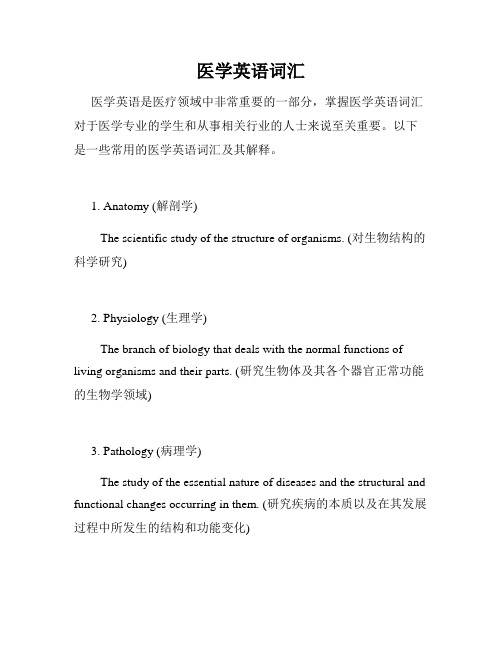
医学英语词汇医学英语是医疗领域中非常重要的一部分,掌握医学英语词汇对于医学专业的学生和从事相关行业的人士来说至关重要。
以下是一些常用的医学英语词汇及其解释。
1. Anatomy (解剖学)The scientific study of the structure of organisms. (对生物结构的科学研究)2. Physiology (生理学)The branch of biology that deals with the normal functions of living organisms and their parts. (研究生物体及其各个器官正常功能的生物学领域)3. Pathology (病理学)The study of the essential nature of diseases and the structural and functional changes occurring in them. (研究疾病的本质以及在其发展过程中所发生的结构和功能变化)4. Diagnosis (诊断)The identification of the nature and cause of a certain disease or condition through examination and evaluation of medical signs and symptoms. (通过检查和评估医学体征和症状来确定某种疾病或病情的性质和原因)5. Treatment (治疗)The management and care of a patient with a medical condition, including the use of medicines, surgery, and other therapeutic methods. (对患有某种病症的患者进行管理和护理,包括使用药物、手术和其他治疗方法)6. Surgery (外科手术)The branch of medicine that uses operative procedures to treat injuries, diseases, and deformities. (通过手术方式治疗损伤、疾病和畸形的医学科目)7. Radiology (放射学)The branch of medicine that uses medical imaging and radiation to diagnose and treat diseases. (利用医学成像和辐射来诊断和治疗疾病的医学学科)8. Pharmacology (药理学)The study of drugs and their effects on living organisms. (研究药物及其对生物体的影响的学科)9. Rehabilitation (康复)The process of restoring a person's physical, mental, and social abilities after injury or illness. (在受伤或生病后恢复一个人的身体、精神和社交能力的过程)10. Pediatrics (儿科)The branch of medicine that deals with the medical care of infants, children, and adolescents. (从事婴儿、儿童和青少年的医疗保健的学科)11. Obstetrics (产科)The branch of medicine that deals with childbirth and the care of women during pregnancy and after childbirth. (处理分娩、孕期和分娩后妇女保健的学科)12. Gynecology (妇科)The branch of medicine that deals with the female reproductive system and its diseases. (研究女性生殖系统及其疾病的学科)13. Neurology (神经学)The branch of medicine that deals with disorders of the nervous system. (研究神经系统疾病的学科)14. Cardiology (心脏病学)The branch of medicine that deals with the study and treatment of heart disorders. (研究和治疗心脏疾病的学科)15. Oncology (肿瘤学)The branch of medicine that deals with the prevention, diagnosis, and treatment of cancer. (研究肿瘤预防、诊断和治疗的学科)以上是一些常见的医学英语词汇及其解释,掌握这些词汇对于在医学领域工作或学习英语的医学专业人士来说至关重要。
优秀医学生必须掌握的医学英语基本词汇及汉语含义
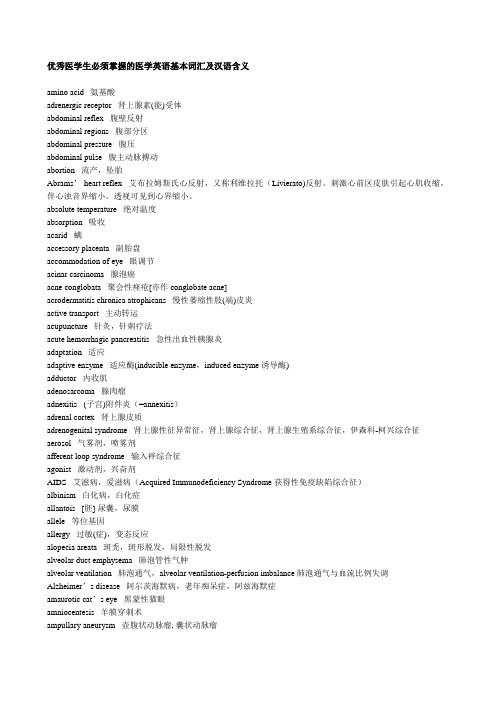
优秀医学生必须掌握的医学英语基本词汇及汉语含义amino acid 氨基酸adrenergic receptor 肾上腺素(能)受体abdominal reflex 腹壁反射abdominal regions 腹部分区abdominal pressure 腹压abdominal pulse 腹主动脉搏动abortion 流产,坠胎Abrams’ heart reflex 艾布拉姆斯氏心反射,又称利维拉托(Livierato)反射。
刺激心前区皮肤引起心肌收缩,伴心浊音界缩小。
透视可见到心界缩小。
absolute temperature 绝对温度absorption 吸收acarid 螨accessory placenta 副胎盘accommodation of eye 眼调节acinar carcinoma 腺泡癌acne conglobata 聚会性痤疮[亦作conglobate acne]acrodermatitis chronica atrophicans 慢性萎缩性肢(端)皮炎active transport 主动转运acupuncture 针灸,针刺疗法acute hemorrhagic pancreatitis 急性出血性胰腺炎adaptation 适应adaptive enzyme 适应酶(inducible enzyme,induced enzyme诱导酶)adductor 内收肌adenosarcoma 腺肉瘤adnexitis (子宫)附件炎(=annexitis)adrenal cortex 肾上腺皮质adrenogenital syndrome 肾上腺性征异常征,肾上腺综合征,肾上腺生殖系综合征,伊森科-柯兴综合征aerosol 气雾剂,喷雾剂afferent loop syndrome 输入袢综合征agonist 激动剂,兴奋剂AIDS 艾滋病,爱滋病(Acquired Immunodeficiency Syndrome 获得性免疫缺陷综合征)albinism 白化病,白化症allantois [胚] 尿囊,尿膜allele 等位基因allergy 过敏(症),变态反应alopecia areata 斑秃,斑形脱发,局限性脱发alveolar duct emphysema 肺泡管性气肿alveolar ventilation 肺泡通气,alveolar ventilation-perfusion imbalance肺泡通气与血流比例失调Alzheimer’s disease 阿尔茨海默病,老年痴呆症,阿兹海默症amaurotic cat’s eye 黑蒙性猫眼amniocentesis 羊膜穿刺术ampullary aneurysm 壶腹状动脉瘤, 囊状动脉瘤anaphase (细胞分裂)后期anastomosis 吻合(术)anesthesia 麻醉(anaesthesia)aneurysm 动脉瘤(aneurism)angina pectoris 心绞痛angiogram 血管造影片angiosarcoma 血管肉瘤Angle’s classification of malocclusion 安格氏矫正分类法(malocclusion 错位咬合,咬合不正)anneal 退火(核酸经退火后能与互补的核酸结合)anomalous uterus 异常子宫anoxia 缺氧(症)anteflexion (尤指子宫)前屈antegrade urography 顺行尿路造影(术)anthracosilicosis 煤矽肺,炭末石末沉着病[亦作 anthrasilicosis]antibiotic 抗生素antidepressant 抗抑郁剂(药)antigen 抗原antioncogene 抗癌基因aortic stenosis 主动脉瓣狭窄aperture diaphragm 光圈apex of heart 心尖(部位)Apgar score 阿普加(新生儿)评分appendix 阑尾arborvirus 虫媒病毒[蚊虫等节肢动物传染的病毒(脑炎、黄热病、登革热的病原体)]arches of the foot 足弓arcus aortae 主动脉弓areola 乳(房)晕, 色晕arterial arch of colon 结肠动脉弓arteriography 动脉造影术,动脉X线摄影,动脉搏描记法arteriovenous oxygen difference 动静脉氧差arthroplasty 关节成形术,关节造形术arthrosis 关节,关节病artificial pacemaker 人工(心脏)起搏器Ascaris lumbricoides 蛔虫ascending cervical artery 升颌动脉aspergilloma 曲霉菌球Aspergillus fumigatus 烟曲霉(菌)assisted reproductive technology ART,辅助生殖技术,人工生殖技术astigmatism 散光(亦作 astigmia);像散性,像散现象astrocyte (脑和脊髓的)星形胶质细胞,星形细胞atherosclerosis 动脉粥样硬化;动脉硬化[复数atheroscleroses ]atrial septal defect (心)房中隔缺损atrial flutter 心房扑动atrial fibrillation 心房纤颤,房颤,心房纤维性颤动atrioventricular valve 房室瓣atrophic gastritis 萎缩性胃炎audiogram 听力图,听力敏度图,听阈曲线auditory pathway 听觉传导通路auscultation 听诊(法)autoantibody 自身抗体autonomic nervous system 自主神经系统,植物性神经系统autoplastic graft (=autograft) 自体移植物,自体组织移接,自体嫁接axon reflex 轴突反射azotemia 氮质血症baby 婴儿background radiation 本底辐射,背景辐射bacteriophage 噬菌体bacterium 细菌,杆菌属[ 复数bacteria ]Baker’s cyst 贝克氏囊肿(膝部囊肿,腘窝囊肿)barbiturate 巴比妥类药物(用作中枢神经系统抑制或安眠的药),巴比妥酸盐Barrett’s syndrome Barrett's syndrome is a condition in which the esophagus, the muscular tube that carries food and saliva fro m the mouth to the stomach, forms new types of cells on its surface that are similar to those normally found in the intest ine.base pair 碱基对basilar lamina 基底,颅底,头盖骨底部basilar vertebra 基椎,末腰椎basophilia 嗜碱性,嗜碱细胞增多bilaminar blastoderm 二层胚盘bile 胆汁Billroth’s operation I Billroth's operation I is an operation in which the pylorus is removed and the distal stomach is anastomos ed directly to the duodenum.The operation is most closely associated with Theodor Billroth, but was first described by Polish surgeon Ludwik Rydigier.birth canal 产道bisalbuminemia 双白蛋白血症,副白蛋白血症,是一种较少见的常染色体不完全显性遗传性病,表现为白蛋白呈异常双峰现象(两峰高度大致相等,一峰为正常白蛋白,另一峰为变异白蛋白)bivalve speculum 双瓣窥器blastoderm 胚盘,胚层block vertebrae 阻滞椎,块状椎blood-brain barrier 血脑屏障blood pressure 血压blood plasma 血浆blow-out fracture 爆裂性骨折(尤指眶底)Bowditch’s law 鲍迪奇氏定律(心肌刺激定律,神经不疲劳性)Bracht maneuver Bracht手法,a method of extraction of the aftercoming head(后出胎头) in breech presentation(臀先露).breathing 呼吸bronchial asthma 支气管哮喘bronchiolar carcinoma (细)支气管癌bronchiolitis (毛)细支气管炎bronchiole-alveolar carcinoma 细支气管-肺泡癌(起源于细支气管基底细胞或Ⅱ型肺泡细胞的恶性肿瘤) bronchogram 支气管造影片Bryant’s triangle 布莱恩特氏三角, 髂股三角burn 烧伤bypass 旁路,支路calcaneal tuber 跟结节calyx 盏,杯状结构capillary 毛细管capture-recapture method 【统计学】捕获-再捕获法,标记再捕法,捕捉—重捕方法carbon dioxide cycle 二氧化碳循环carcinoma 癌(在医学上专指由上皮组织来源的恶性肿瘤)carcinoma in situ 原位癌cardiac arrest 心搏停止,心脏停止跳动cardiac cycle 心动周期(从收缩经松弛再到下次收缩之全部过程)cardiomyopathy (尤指原发性的)心肌症cardiovascular system 心血管系统caries [单数复数同]龋齿,骨溃疡cavitas laryngis 喉腔CD4/CD8 count CD4/CD8计数cell 细胞,电池cell determination 细胞决定cell membrane 细胞膜cell marker 细胞标记物centroblast 生发中心母细胞cephalic presentation 头先露cerebellar cortex 小脑皮质,小脑皮层cerebellum 小脑cerebral hemorrhage (大)脑出血cerebral cortex 大脑皮层,小脑皮质cerebrospinal fluid 脑脊液chamber (身体或器官内的)室chemoreceptor 化学感受器(=chemoceptor)cholangiography 胆管造影术cholecystitis 胆囊炎cholelithiasis 胆石症,胆结石chondrosarcoma 软骨肉瘤chromosome aberration 染色体畸变chromosome 染色体chronic bronchitis 慢性支气管炎cilia 纤毛,[单数cilium]ciliated epithelium 纤毛上皮circadian 生理节奏的,昼夜节律的,24小时作用(或循环)的 (指与地球24小时运转联系的新陈代谢、内分泌作用及睡眠等节奏有关的;此种节奏在高速宇宙航行中仍可能维持)circular anastomosis 环形吻合术circulus 圈;环 [复数circuli ]cirrhosis 硬化,肝硬化cisternal puncture 小脑延髓池穿刺cleavage 卵裂,分裂clinical epidemiology 临床流行病学clinical trial 临床试验(对一种新疗法的科学评估)cloning 克隆,无性繁殖closed chest massage 胸外心脏按摩Clostridium perfringens 产气荚膜梭菌,产气荚膜杆菌,产气荚膜梭状芽孢杆菌,是一种革兰氏阳性梭状杆菌,能产生芽孢,并能形成特殊荚膜的专性厌氧菌cloverleaf skull 头颅畸形coagulopathy 凝血障碍coarctate retina 紧压性视网膜cochlear duct 耳蜗管,蜗管中道cochlear implant 人工耳(蜗);耳蜗植入,耳蜗移植Cockayne’s syndrome 科凯恩综合征(特征为早老,视网膜退化,听力受损,皮肤光过敏)coenzyme A 辅酶 A [CoA]colon 结肠colony 菌落,集落color 颜色,脸色colposcopy 阴道镜comedo 粉刺,面疱[ 复数comedos或comedones ]Compton effect 康普顿效应(=Compton-Debye effect)computed tomography 计算机断层扫描(CT)conduction 传导conductive deafness 传导性失聪,传导性耳聋conduplicato corpore 胎体层迭cone 视锥(细胞)conization 锥形切除术conjoined twins 联胎,联体双胎,连体婴(= Siamese twins)conjugate 结合constipation 便秘consumption coagulopathy 消耗性凝血病contact lens (装在眼睑内的)隐形眼镜,接触透镜contact dermatitis 接触性皮炎contraction 收缩Coombs’test 抗人球蛋白试验,Coombs 试验,库姆试验coronary artery 冠状动脉coronary bypass 冠状动脉旁路手术,冠状动脉搭桥术costoclavicular syndrome 肋骨锁骨综合征,肋锁综合征(在锁骨与第一肋骨之间的间隙较小,在解剖上是一个弱点,其中通过到上肢的神经血管束。
医学英语术语及应用

医学英语术语及应用医学英语术语是指在医学领域中使用的特定术语和短语。
这些术语通常是拉丁语或希腊语来源,用于描述疾病、诊断、治疗和解剖学等方面的概念。
医学英语术语对于医学专业人士来说至关重要,因为它们可以提供准确的描述和交流。
以下是一些常见的医学英语术语及其应用:1. Diagnosis(诊断):指确定疾病或病因的过程。
医生会使用一系列的临床检查、症状观察和医学测试来进行诊断。
2. Treatment(治疗):指用药物、手术或其他方法来治疗疾病或症状的过程。
治疗的目标是恢复患者的健康状态。
3. Symptoms(症状):指患者出现的主观感觉或病理上的变化。
症状通常是疾病的一个信号,可以帮助医生进行正确的诊断。
4. Anatomy(解剖学):指人体内部结构和器官的科学研究。
医生需要了解人体的解剖学知识,以便更好地理解疾病和进行手术。
5. Physiology(生理学):指人体内各器官和系统的正常功能和机制。
了解生理学可以帮助医生更好地理解疾病的发生机制。
6. Laboratory Tests(实验室测试):指通过检查血液、尿液、组织样本等来评估患者的健康状况和诊断疾病。
7. Prescription(处方):指医生为患者开出的药物治疗的指示。
处方通常包括药物的名称、剂量、用法和用药频率。
8. Surgery(手术):指通过切口或其他操作来修复组织或器官的过程。
外科手术通常需要麻醉和显微镜等特殊设备。
9. Radiology(放射学):指使用X射线、MRI、CT扫描等放射技术来检查和诊断疾病。
这些技术可以提供内部器官的影像。
10. Pathology(病理学):指对疾病发生和病变机制进行研究的科学。
病理学家通过组织样本的检查来确定疾病的类型和严重程度。
医学英语术语的应用非常广泛,不仅限于医生和护士之间的交流,还包括医学文献的阅读和翻译、研究工作的报告以及与患者进行沟通。
在与患者交流时,医生需要使用简单且易于理解的词汇解释疾病和治疗方法,以确保患者充分理解和参与治疗决策。
(完整版)医学专业英语词汇
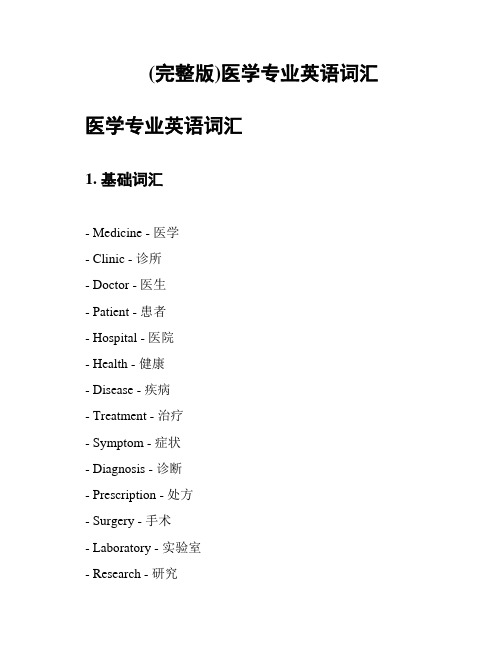
(完整版)医学专业英语词汇医学专业英语词汇1. 基础词汇- Medicine - 医学- Clinic - 诊所- Doctor - 医生- Patient - 患者- Hospital - 医院- Health - 健康- Disease - 疾病- Treatment - 治疗- Symptom - 症状- Diagnosis - 诊断- Prescription - 处方- Surgery - 手术- Laboratory - 实验室- Research - 研究- University - 大学- Medical - 医疗的- Nurse - 护士- Pharmacist - 药剂师- Therapist - 治疗师- Vaccine - 疫苗- X-ray - X光片- HIV - 人类免疫缺陷病毒- Cancer - 癌症- Diabetes - 糖尿病- Heart - 心脏- Kidney - 肾脏- Liver - 肝脏2. 解剖学词汇- Anatomy - 解剖学- Skeleton - 骨骼- Muscle - 肌肉- Nervous system - 神经系统- Digestive system - 消化系统- Respiratory system - 呼吸系统- Circulatory system - 循环系统- Skeletal system - 骨骼系统- Muscular system - 肌肉系统- Nervous tissue - 神经组织- Respiratory tract - 呼吸道- Circulatory system - 循环系统- Digestive tract - 消化道- Central nervous system - 中枢神经系统- Peripheral nervous system - 外周神经系统- Endocrine system - 内分泌系统- Urinary system - 泌尿系统3. 疾病词汇- Infection - 感染- Allergy - 过敏- Fever - 发烧- Inflammation - 炎症- Pain - 疼痛- Cough - 咳嗽- Headache - 头痛- Fatigue - 疲劳- Depression - 抑郁症- High blood pressure - 高血压- Arthritis - 关节炎- Asthma - 哮喘- Alzheimer's disease - 阿尔茨海默病- Stroke - 中风- Multiple sclerosis - 多发性硬化症- Pneumonia - 肺炎- Cancer - 癌症- Diabetes - 糖尿病- Heart disease - 心脏病- Kidney disease - 肾脏疾病- Liver disease - 肝脏疾病- Sexually transmitted disease - 性传播疾病4. 检查和测试词汇- Blood test - 血液检查- Urine test - 尿液检查- X-ray - X光检查- Ultrasound - 超声波- MRI (Magnetic Resonance Imaging) - 磁共振成像- ECG (Electrocardiogram) - 心电图- PET scan (Positron Emission Tomography) - 正电子发射断层扫描- Colonoscopy - 结肠镜检查- Pap smear - 涂片检查- Biopsy - 活检- Lymph node biopsy - 淋巴结活检- Bone marrow biopsy - 骨髓活检5. 药物相关词汇- Medication - 药物- Drug - 药品- Prescription - 处方药- Over-the-counter (OTC) - 非处方药- Antibiotics - 抗生素- Analgesics - 镇痛药- Antidepressants - 抗抑郁药- Antipyretics - 退热药- Antihistamines - 抗组织胺药- Anticoagulants - 抗凝药- Opioids - 麻醉药- Diuretics - 利尿药- Antivirals - 抗病毒药- Anti-inflammatory - 抗炎药- Beta blockers - 贝塔受体阻滞剂- Statins - 他汀类药物- Vaccines - 疫苗- Insulin - 胰岛素- Cholesterol-lowering drugs - 降低胆固醇药物以上是医学专业英语词汇的一部分,希望对您的学习和工作有所帮助。
医学英语术语及应用第一章前缀prefixes kindle适用

医学英语术语学及应用必背单词表第一章前缀Prefixes 一、表位置ad- toward向……ab- away from, off离开……af- towardef- out of, fromante- forward, before前antebrachium前臂antecardium上腹部retro- backward, or located behind后retrocervical颈后的cervix颈anter/o- farther forward更前poster/o- farther back更后dextr/o- on the right side右dextrocardia右位心extra/o- outside of, beyondIntra/o- inside, withinInfer- lower低、下Super- above, over, higher高、上Infra- inferior to, below, or beneathInfracostal肋下的Supra- above, oversupracostal肋上的Hyper- over, above, beyond; excessive Hypo- beneath, underEndo- inside, innerExo- out of, outsideCircum- around, encircling周围Co- with, togethercoenzyme辅酶De- down from, away from, offdif- apart, separate散开,传播Dis- apart, separateEn- in, on, withinEpi- upon, above, or besideIn- in, into, on, toward, againstOb- against, in the way ofPer- through, throughout穿过Re- back, againsub- undersyn- with, together, fusedsynthesis合成Trans- across, through, beyond, overTranscutaneous经皮的Ultra- beyondAnti- against, opposing, or oppositeDia- through; thorough, thoroughly; apart Ecto- outside of, outerectoderm外胚层Mes/o- in the middle, intermediate, or moderatePara- beside, by the side of, beyondparathyroid甲状旁腺peri- around周围pericardium心包膜Tele- far away, at a distance远二、表否定A-/an- not, without, absence ofapnea呼吸暂停anemia贫血De- do or make the opposite of; reverse;Remove fromdehydration脱水Dis- not; the converse ofdyspepsia消化不良dyspnea呼吸困难In-, il-, ir-, im-, notNon- notNon-infectious非传染性的Un- not三、表数量①uni-, haplo-Haploid单倍体②bi-, di-, diplo-,Biceps二头肌③tri-, ter-,Teroxide三氧化物④quadri-, quadru-, quadr-, tera-Quadriceps四头肌tetraplegia四肢麻痹⑤penta-Pentagan五角大楼⑩deca-Deci- tenthdecimeter分米Oligo- little, few少Poly- much, many多Plur- more than oneMulti- many; much; multipleHolo- wholePan- all全四、表颜色白alb/i-, albino/o-, album/o- albino白化病患者Leuk/o-, leuc/o-leukemia白血病绿chloro-chlorophyll叶绿素红erythr/o-erythrocyte红细胞Rub-, rubi-, rube/o-bilirubin胆红素蓝cyan/o-Cyanosis发绀,紫绀灰glauc/o-glaucoma青光眼黑melan/o-黄xanth/o-Xanthoderma黄皮病五、其他Brachy- shortBrady- slowbradypnea呼吸过缓tachypnea呼吸过速Hetero- other; differentHomo-, homeo, homio- same; likeMal- bad, badly; abnormal, abnormallymalnutrition营养不良Eu- 好的,与mal- 相对euthanasia安乐死。
医学英语术语学及应用
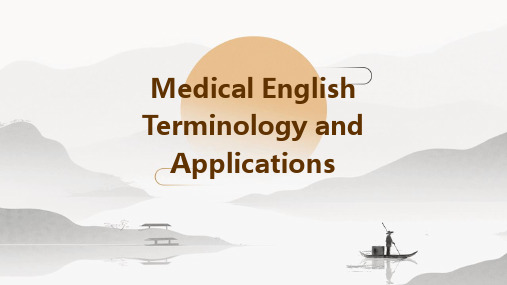
02
Medical students and professionals need to have a solid understanding of Medical English Terminology to learn and apply medical knowledge effectively
Blending
combining the sounds or meanings of two or more words to create a new word, such as "radiapy" (combining "radiation" and "therapy")
Acronymy
Creating a word from the initial letters of a phrase or group of words, all as AIDS
Affix
a prefix or suffix that modifies the meaning of a root word, such as "- economy" in "appendix"
Compound
a combination of two or more words that form a new meaning, such as "heart disease"
Learning advanced medical concepts: By reading medical literature, one can learn international advanced medical concepts and diagnosis and treatment ideas, understand the latest medical development trends, and provide guidance for clinical work.
医学常用英语
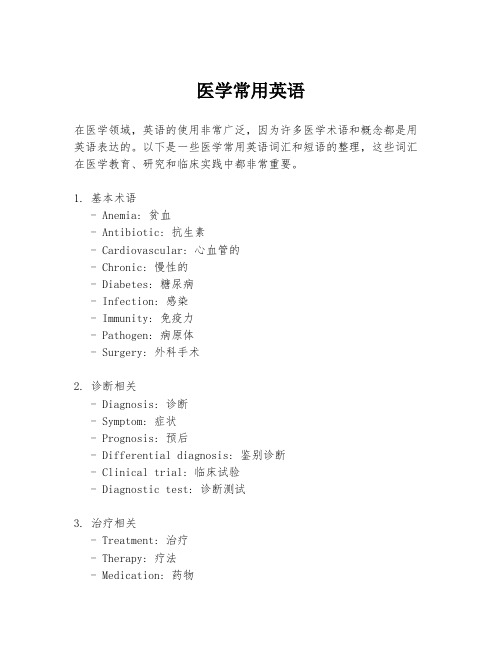
医学常用英语在医学领域,英语的使用非常广泛,因为许多医学术语和概念都是用英语表达的。
以下是一些医学常用英语词汇和短语的整理,这些词汇在医学教育、研究和临床实践中都非常重要。
1. 基本术语- Anemia: 贫血- Antibiotic: 抗生素- Cardiovascular: 心血管的- Chronic: 慢性的- Diabetes: 糖尿病- Infection: 感染- Immunity: 免疫力- Pathogen: 病原体- Surgery: 外科手术2. 诊断相关- Diagnosis: 诊断- Symptom: 症状- Prognosis: 预后- Differential diagnosis: 鉴别诊断- Clinical trial: 临床试验- Diagnostic test: 诊断测试3. 治疗相关- Treatment: 治疗- Therapy: 疗法- Medication: 药物- Prescription: 处方- Dosage: 剂量- Side effect: 副作用4. 医学设备和工具- Stethoscope: 听诊器- Syringe: 注射器- Scalpel: 手术刀- X-ray: X光- MRI: 磁共振成像- ECG: 心电图5. 医学专业和角色- Physician: 医生- Surgeon: 外科医生- Nurse: 护士- Pharmacist: 药剂师- Radiologist: 放射科医生 - Pathologist: 病理学家6. 医学研究- Research: 研究- Hypothesis: 假设- Clinical study: 临床研究 - Epidemiology: 流行病学 - Biomedical: 生物医学- Pharmacology: 药理学7. 医疗保健系统- Healthcare: 医疗保健- Hospital: 医院- Clinic: 诊所- Insurance: 保险- Primary care: 初级保健- Specialist: 专科医生8. 医学伦理- Ethics: 伦理- Consent: 同意- Confidentiality: 保密- Malpractice: 医疗事故- Informed consent: 知情同意9. 医学教育- Curriculum: 课程- Lecture: 讲座- Seminar: 研讨会- Internship: 实习- Residency: 住院医师10. 公共卫生- Public health: 公共卫生- Epidemic: 流行病- Pandemic: 大流行- Vaccination: 疫苗接种- Hygiene: 卫生这些词汇和短语是医学领域中的基础,对于医学生、医生、研究人员和其他医疗保健专业人员来说,掌握这些英语表达是非常重要的。
医学专业英语词汇:全面掌握
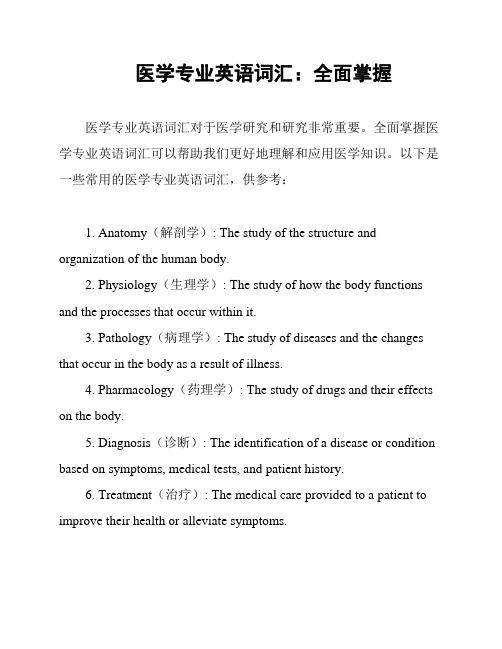
医学专业英语词汇:全面掌握医学专业英语词汇对于医学研究和研究非常重要。
全面掌握医学专业英语词汇可以帮助我们更好地理解和应用医学知识。
以下是一些常用的医学专业英语词汇,供参考:1. Anatomy(解剖学): The study of the structure and organization of the human body.2. Physiology(生理学): The study of how the body functions and the processes that occur within it.3. Pathology(病理学): The study of diseases and the changes that occur in the body as a result of illness.4. Pharmacology(药理学): The study of drugs and their effects on the body.5. Diagnosis(诊断): The identification of a disease or condition based on symptoms, medical tests, and patient history.6. Treatment(治疗): The medical care provided to a patient to improve their health or alleviate symptoms.7. Surgery(外科手术): The branch of medicine that involves using manual or instrumental techniques to treat diseases or injuries through operative procedures.8. Radiology(放射学): The use of medical imaging techniques, such as X-rays or MRI, to diagnose and treat diseases.9. Pediatrics(儿科学): The branch of medicine that focuses on the medical care of infants, children, and adolescents.10. Obstetrics and Gynecology(产科学和妇科学): The branch of medicine that deals with pregnancy, childbirth, and the female reproductive system.以上是一些医学专业英语词汇的简要介绍,希望对你的医学研究有所帮助。
精选医学专业英语词汇大全
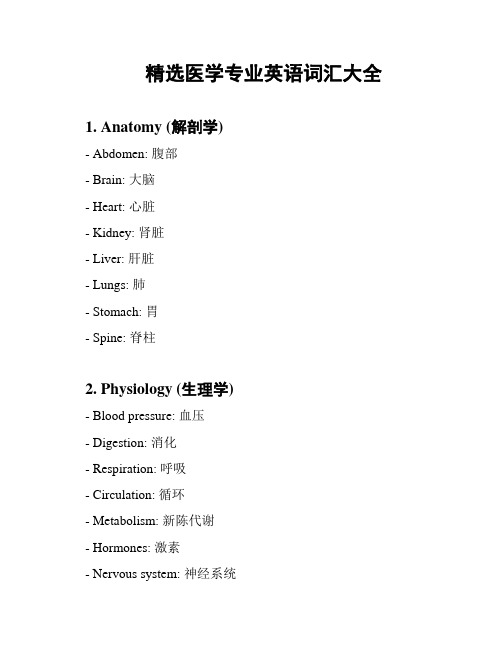
精选医学专业英语词汇大全1. Anatomy (解剖学)- Abdomen: 腹部- Brain: 大脑- Heart: 心脏- Kidney: 肾脏- Liver: 肝脏- Lungs: 肺- Stomach: 胃- Spine: 脊柱2. Physiology (生理学)- Blood pressure: 血压- Digestion: 消化- Respiration: 呼吸- Circulation: 循环- Metabolism: 新陈代谢- Hormones: 激素- Nervous system: 神经系统- Immune system: 免疫系统3. Diseases and Conditions (疾病与病况) - Diabetes: 糖尿病- Cancer: 癌症- Asthma: 哮喘- Hypertension: 高血压- Arthritis: 关节炎- Depression: 抑郁症- Obesity: 肥胖症- Pneumonia: 肺炎4. Medical Procedures (医疗程序)- Surgery: 手术- X-ray: X射线- MRI (Magnetic Resonance Imaging): 磁共振成像- Blood test: 血液检查- Vaccination: 疫苗接种- Dialysis: 透析- Chemotherapy: 化疗5. Medical Specialties (医学专科) - Cardiology: 心脏病学- Dermatology: 皮肤科- Gastroenterology: 胃肠病学- Neurology: 神经学- Psychiatry: 精神病学- Obstetrics and Gynecology: 妇产科- Orthopedics: 骨科- Pediatrics: 儿科6. Medical Instruments (医疗器械) - Stethoscope: 听诊器- Thermometer: 温度计- Sphygmomanometer: 血压计- Scalpel: 解剖刀- Syringe: 注射器- Electrocardiograph: 心电图仪- Ultrasound machine: 超声波机- Endoscope: 内窥镜以上是一份精选医学专业英语词汇大全,涵盖了解剖学、生理学、疾病与病况、医疗程序、医学专科和医疗器械等方面的词汇。
医学英语的一些词汇学习资料

医学英语的一些词汇学习资料常见的医学专业英语词汇应用生物学 Applied Biology 医学技术 Medical Technology细胞生物学 Cell Biology 医学 Medicine生物学 Biology 护理麻醉学 Nurse Anesthesia进化生物学 Evolutionary Biology 口腔外科学 Oral Surgery海洋生物学 Marine Biology 口腔/牙科科学 Oral/Dental Sciences微生物学 Microbiology 骨科医学 Osteopathic Medicine分子生物学 Molecular Biology 耳科学 Otology医学微生物学 Medical Microbiology 理疗学 Physical Therapy口腔生物学 Oral Biology 足病医学 Podiatric Medicine寄生物学 Parasutology 眼科学 Ophthalmology植物生物学 Plant Physiology 预防医学 Preventive Medicine心理生物学 Psychobiology 放射学 Radiology放射生物学 Radiation Biology 康复咨询学 Rehabilitation Counseling 理论生物学 Theoretical Biology 康复护理学 Rehabilitation Nursing 野生生物学 Wildlife Biology 外科护理学 Surgical Nursing环境生物学 Environmental Biology 治疗学 Therapeutics运动生物学 Exercise Physiology 畸形学 Teratology有机体生物学 Organismal Biology 兽医学 Veterinary Sciences生物统计学 Biometrics 牙科卫生学 Dental Sciences生物物理学Biophysics 牙科科学 Dentistry生物心理学 Biopsychology 皮肤学 Dermatology生物统计学 Biostatistics 内分泌学 Endocrinology生物工艺学 Biotechnology 遗传学 Genetics生物化学 Biological Chemistry 解剖学 Anatomy生物工程学 Biological Engineering 麻醉学 Anesthesia生物数学 Biomathematics 临床科学 Clinical Science生物医学科学 Biomedical Science 临床心理学 Clinical Psychology 细胞生物学和分子生物学 Celluar and Molecular Biology医学专业英语词汇学习-外科护理常用英语伤口护理 wound management伤口 wound一、伤口的性质 nature of wound bed1、健康肉芽形成 healthy granulation2、上皮形成 epithelization3、腐肉 slough4、黑色或棕色坏死组织 black/brown necrotic tissue5、其他(具体说明) specify二、渗出液 extravasate1、容量 volume 1)较少 slight 2)中等 moderate 3)大量 large2、性质 type 1)血清的 serous 2)血污的 blood stained 3)脓性的purulent3、气味 odour 1)没有 none 2)温和的 mild 3)刺激的 offensive三、伤口周边 wound margin1、颜色 colour2、水肿的 dropsical四、伤口深度 wound depth五、红斑 erythema1、呈现 present2、离伤口的最远距离 max, distance from wound六、周围皮肤的性质 general condition of surrounding skin1、干燥 dry2、湿疹 eczema七、疼痛程度 pain1、没有 0 none 温和 1 mild 中等 2 moderate 严重 3 severe2、间歇的 intermittent 恒定不变的 constant 换药时 at dressing change八、感染 infection1、疑似 suspected2、伤口拭子送检 wound swab sent3、确诊病菌感染 confirmed医学英语—常用护理词汇Nursing processes 护理过程assessment 估计nursing diagnosis 护理诊断planning 计划intervention (implementation, management) 措施(实施、管理) evaluation 评价Daily care of the patient 对病人的日常护理morning (evening) care, AM (HS) care 晨(晚)间护理bedmaking 整理床铺oral hygiene (mouth care) 口腔卫生brushing the teeth 刷牙flossing the teeth 清牙垢denture care 清洗假牙bathing 洗澡cleanliness and skin care 清洁与皮肤护理perineal care 洗会阴hair 梳头shaving 刮脸Care of nails and feet 指甲修剪和洗脚changing hospital gowns 更换住院服装massage 按摩bedsore care 褥疮护理Measurement of vital signs 测量生命体征taking oral (rectal, axillary) temperature量口腔(直肠、腋下)体温taking a radial pulse 测量桡动脉脉搏counting respirations 计呼吸次数measuring (taking) blood pressure 量血压Catheterization 导管插入术 cardiac catheterization 心导管插入术laryngeal catheterization喉插管术retro-urethral catheterization 逆行导尿管插入术urethral catheterization 尿道导管插入术Clean techniques, medical asepsis 消毒灭菌asepsis 无菌(法)integral asepsis 完全无菌disinfection 消毒concomitant (concurrent) disinfection 随时消毒,即时消毒steam disinfection 蒸汽消毒terminal disinfection 终末消毒disinfection by ultraviolet light 紫外线消毒Sterilization 灭菌,消毒chemical sterilization 化学灭菌法fractional sterilization 间歇灭菌法intermittent sterilization 间歇灭菌法mechanical sterilization 器械灭菌法Decompression 减压(术)oardiac decompression 心减压术cerebral decompression 脑减压术orbital decompression 眼眶减压术decompression of decompression 心包减压术gastro-intestinal decompression 胃肠减压术decompression of rectum 直肠减压术decompression of spinal cord 脊髓减压术Dialysis透析peritoneal dialysis腹膜透析hemodialysis 血液透析Drainage 引流、导液aspiration (suction) drainage 吸引导液(引流)closed drainage 关闭引流法negative pressure drainage 负压吸引法open drainage 开放引流法postural drainage 体位引流法vaginal drainage 阴道引流法vesicocelomic drainage 膀胱腹腔引流Drainage 灌肠barium enema钡灌肠blind enema肛管排气法contrast enema对比灌肠glycerin enema甘油灌肠high (low) enema 高(低)位灌肠magnesium sulfate enema 硫酸镁灌肠retention (non-retention) enema 保留(无保留)灌肠soapsuds enema 肥皂水灌肠turpentine enema 松节油灌肠Feeding 饲,喂养Forced (forcible) feeding 强制喂养intubtaion (tube) feeding 管饲法nasal feeding 鼻饲法rectal feeding 直肠营养法Heat and clod applications 冷、热敷 applying hot compresses 热敷applying hot soaks 湿热敷assisting the patient to take a sitz bath 帮病人坐浴applying hot water bottles 用热水瓶applying an ice bag (collar0 用冰袋applying cold compresses 冷敷giving a cold (an alcohol) sponge bath 冷水(酒精)擦浴Infusion 输入,注入glucose infusion 葡萄糖液输注glucose-saline infusion 葡萄糖-盐水输注saline infusion 盐水输注Injection 注射endermic (intracutaneous) injection 皮内注射hypertonic saline injection 高渗盐水注射hypodermic injection 皮下注射intramuscular injection 肌内注射intraocular injection 眼球注射intrapleural injection 胸膜腔注射intrauterine injection 子宫内注射nasal injection 鼻内注射peritoneal injection 腹膜腔注射rectal injection 直肠注射subconjunctival injection 结膜下注射urethral injection 尿道注射vaginal injection 阴道注射Irrigation 冲洗vaginal irrigation 阴道冲洗bladder irrigation 膀胱冲洗continuous irrigation 连续冲洗法mediate irrigation 间接冲洗法Isolation 隔离、分离strict isolation 严密隔离contact isolation 接触隔离respiratory isolation 呼吸隔离drainage (secretion) precautions 引流预防措施enteric precautions 肠道预防措施blood (body fluid) precautions 血液(体液)预防措施protective isolation 保护性隔离Lavage 灌洗blood (systemic) lavage 血液毒素清洗法ether lavage (腹腔内)乙醚洗法gastric lavage 洗胃intestinal lavage 洗肠peritoneal lavage 腹膜腔灌洗pleural lavage 胸膜腔灌洗Medication 药疗,投药,给药 endermic medication 皮内透药法hypodermatic medication 皮下投药法intramuscular medication 肌肉投药法ionic medication 离子透药疗法nasal medication 鼻内投药法oral medication 口服法rectal medication 直肠投药法sublingual medication 舌下投药法transduodenal medication 十二指肠内投药法vaginal medication 阴道投药法Suctioning 吸气引液upper airway suctioning 上呼吸道抽吸法nasogastric suctioning 鼻胃抽吸wound suctioning 伤口吸引Transfusion 输血arterial transfusion 动脉输血blood transfusion 输血direct (immediate ) transfusion 直接输血drip transfusion 滴注输(血)液indirect transfusion 间接输血plasma transfusion 输血浆serum transfusion 输血清venous transfusion 静脉输血,静脉输液Diet nursing 伙食护理 absolute diet (fasting) 禁食balanced diet 均衡伙食convalescent diet 恢复期饮食diabetic diet 糖尿病饮食eucaloric diet 适当热量饮食fat-free diet 无脂饮食salt-free diet 无盐饮食fever diet 热病饮食full diet 全食,普通饮食half diet 半食high caloric diet 高热量饮食high-carbohydrate diet 高糖类饮食high-protein (protein rich) diet 高蛋白饮食invalid diet 病弱者饮食light diet 易消化饮食liquid diet 流质饮食high fat diet 高脂饮食low fat diet 低脂饮食low caloric diet 低热量饮食low-protein diet 低蛋白饮食low-residue diet 低渣饮食nourishing diet 滋补饮食obesity diet 肥胖病饮食prenatal diet 孕期饮食regimen diet 规定食谱smooth (soft) diet 细软饮食Preparing the patient for the surgery 为病人手术前做准备s having the patient‘s skin (skin prep) 备皮医.学anesthesia 麻醉Postoperative care 手术后护理coughing and deep-breathing exercises 咳嗽呼吸练习applying elastic stockings 穿弹性袜applying elastic bandages 用弹性绷带Emergency care (first aid) 急救护理cardiopulmonary resuscitation 心肺循环复苏术mouth-to-mouth(mouth-to-nose,mouth-to-stoma) resuscitation口对口(口对鼻,口对颈部小口)循环复苏术emergency care for fainting (shock, stroke) victims昏厥(休克、中风)患者急救emergency care used to control hemorrhage 止血急救emergency care given to help a patient who is vomiting呕吐患者急救emergency care for a patient during a seizure 癫痫发作急救hospice care 临终护理postmortem care 死后护理医学英语词汇学习资料。
医学英语术语学及应用 ppt

Neologism :oxygen, protein, nuclear, vaccine (Latin /Greek roots)
-
11
Late Modern English (1800 - Present)
Horsepower, airplane, typewriter (English roots)
This burst of neologism continues today, visible in the field of electronics and computers: cyber-, bios, hard-drive, and microchip
-
7
The Norman Conquest and Middle English (1100 -1500)
William the Conqueror, the Duke of Normandy, subsequently King William I, invaded and conquered England and the Anglo-Saxons in 1066. They spoke a dialect of Old French known as Anglo-Norman. The Normans were also of Germanic stock and Anglo-Norman was a French dialect that had considerable Germanic influences in addition to the basic Latin roots.
医学英语词汇

医学英语词汇医学英语词汇在医学领域中扮演着重要的角色,它是医务人员进行专业交流和学习的基础。
掌握丰富的医学英语词汇不仅有助于医务人员与国际同行进行交流,也有利于日常临床工作的展开。
本文将介绍一些常见的医学英语词汇及其意义,帮助读者更好地理解医学领域的专业术语。
常见医学英语词汇1. Diagnosis(诊断)Diagnosis是医学英语中常见的词汇,指的是医生对患者病情进行的判断和确认过程。
诊断是医生根据病史、体格检查和实验室检查等手段得出的结论,有助于确定病因和制定治疗方案。
2. Treatment(治疗)Treatment是医学领域中用于描述治疗方法和措施的词汇。
治疗包括药物治疗、手术治疗、物理治疗等方式,旨在帮助患者缓解症状、恢复健康。
3. Symptom(症状)Symptom指的是患者主观感受到的异常状况或体征,如头痛、发热、咳嗽等。
症状是医生进行诊断和治疗的重要线索,有助于确定疾病的类型和进展。
4. Prescription(处方)Prescription是医生根据诊断结果为患者开具的药物治疗方案。
处方中包含药品的名称、用法、用量等信息,患者需按照处方要求正确使用药物。
5. Surgery(手术)Surgery是指医生通过手术方式干预患者疾病的治疗方法。
手术通常需要在手术室进行,需要高度专业的团队和设备配合完成。
医学英语词汇的重要性医学英语词汇的重要性不言而喻。
在一个日益国际化的背景下,医务人员需要与来自不同国家的同行进行交流和合作。
掌握医学英语词汇能够更好地理解国外学术资料、参与国际学术交流,并为患者提供更优质的医疗服务。
另外,医学英语词汇的学习也有助于医务人员提升专业水平。
许多医学领域的最新研究成果和治疗方法都是通过国际学术期刊或会议传播的,只有掌握医学英语才能及时了解这些信息并应用于实践中。
结语医学英语词汇是医学领域中的重要组成部分,对医务人员的专业发展和国际交流具有重要意义。
希望通过本文对一些常见医学英语词汇的介绍,读者能够更加了解医学领域的专业术语,提升自己的学术水平和专业能力。
医学英语专业术语整理

医学英语专业术语整理在医学领域,准确理解和运用专业术语至关重要。
这些术语不仅是医疗工作者之间交流的重要工具,也是患者获取准确医疗信息的关键。
下面为大家整理了一些常见的医学英语专业术语。
一、解剖学相关术语1、 Anatomy(解剖学):研究生物体结构的学科。
2、 Skeleton(骨骼):构成身体框架的硬组织。
3、 Skull(颅骨):保护大脑的骨头结构。
4、 Ribs(肋骨):胸部的骨头,保护胸腔内的器官。
5、 Vertebra(脊椎骨):组成脊柱的骨头。
6、 Pelvis(骨盆):连接下肢和躯干的骨骼结构。
二、生理学相关术语1、 Physiology(生理学):研究生物体功能的学科。
2、 Circulation(血液循环):血液在体内的流动。
3、Respiration(呼吸):生物体吸入氧气和排出二氧化碳的过程。
4、 Digestion(消化):将食物分解为可吸收的营养物质的过程。
5、 Metabolism(新陈代谢):生物体维持生命活动所进行的各种化学反应。
三、病理学相关术语1、 Pathology(病理学):研究疾病的原因、机制和变化的学科。
2、 Infection(感染):病原体侵入生物体引起的疾病。
3、 Inflammation(炎症):身体对损伤或感染的反应。
4、 Tumor(肿瘤):异常细胞的增生形成的肿块。
5、 Cancer(癌症):恶性肿瘤,具有侵袭性和转移性。
四、药理学相关术语1、Pharmacology(药理学):研究药物与生物体相互作用的学科。
2、 Drug(药物):用于治疗、预防或诊断疾病的物质。
3、 Dosage(剂量):药物使用的量。
4、 Side effect(副作用):药物治疗产生的非预期的不良反应。
5、 Antibiotic(抗生素):用于杀灭或抑制细菌生长的药物。
五、诊断学相关术语1、 Diagnosis(诊断):确定疾病的过程。
2、 Symptom(症状):患者自己感觉到的身体异常。
医学英语词汇手册

医学英语词汇手册医学英语词汇手册医学领域的专业术语对于医学学习者来说是至关重要的。
为了帮助广大医学学习者更好地掌握医学英语词汇,本手册提供了一些常用词汇的解释和用法示例。
以下是一些常见的医学英语词汇及其解释:1. diagnosis (n. 诊断)- 判断和确认疾病或条件的过程,通常由医生进行。
例如:The doctor made a diagnosis of pneumonia.2. treatment (n. 治疗)- 对疾病或伤害的医学护理。
例如:Chemotherapy is a common treatment for cancer.3. symptom (n. 症状)- 疾病或疾病存在的特定表现或感觉。
例如:One of the symptoms of the flu is a high fever.4. prescription (n. 处方)- 医生向患者推荐的药物治疗方案。
例如:I need to pick up my prescription at the pharmacy.5. surgery (n. 手术)- 医生通过手术操作来治疗或修复身体的过程。
例如:He underwent surgery to remove his appendix.6. anesthesia (n. 麻醉)- 在手术或疼痛治疗中使用药物使患者无痛觉的过程。
例如:The patient was put under anesthesia before the surgery.7. infection (n. 感染)- 疾病或损伤引起的病原体进入体内并繁殖的状态。
例如:He developed an infection after the surgery.8. vaccination (n. 疫苗接种)- 把疫苗引入体内以防止某种疾病的程序。
例如:Children should receive their vaccinations at a young age.9. medical history (n. 病史)- 个体的过去疾病和治疗的详细记录。
医学专业英语词汇详尽解析

医学专业英语词汇详尽解析一、概述本文档旨在对医学专业英语词汇进行详尽解析,帮助读者更好地理解和运用这些术语。
医学专业英语涉及广泛,包括解剖学、生理学、病理学、药理学等多个领域。
以下将对其中一些常用词汇进行解释和举例,以供参考。
二、常用词汇解析1. Anatomy(解剖学)Anatomy refers to the study of the structure and organization of living organisms. It involves the examination and dissection of body parts to understand their relationships and functions.Example: The anatomy of the human heart includes four chambers - two atria and two ventricles.2. Physiology(生理学)Physiology is the branch of biology that focuses on the functions and processes of living organisms. It explores how different body systems work together to maintain homeostasis.Example: The study of physiology helps us understand how the nervous system controls muscle movements.3. Pathology(病理学)Pathology is the study of diseases and their causes, development, and effects on the body. It involves the examination of tissues, organs, and bodily fluids to diagnose and understand diseases.Example: The pathologist analyzed the tissue sample to determine the presence of cancer cells.4. Pharmacology(药理学)Pharmacology is the study of drugs and their effects on living organisms. It investigates how drugs interact with the body, including their absorption, distribution, metabolism, and excretion.Example: The pharmacology course covers the mechanisms of action of various medications.三、结论以上是医学专业英语中的一些常用词汇解析,涵盖了解剖学、生理学、病理学和药理学等领域。
医学英语术语学及应用
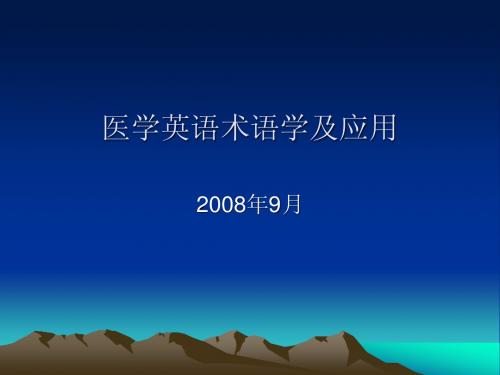
tumor
Words Borrowed from French
• After the Norman Conquest, the conquerors ruled the country for a long period of time and left a deep influence on the English language. A great number of French words, including those used in medical works, took their roots in English. Borrowing from French has continued till present time.
Words Borrowed from French
hospital benign anatomy chronic faint disease artery lymph jaundice mortuary ambulance malaise doctor embolism antibiotic pathology
Words Originated from Greek
acme anorexia colon
coma glaucoma
pandemic psychology
diagnosis metastasis
paralysis
dyspeptic necrosis
pneumonia
Words Originated from Latin
当前缀或词根与另一个词根相连接时该前缀或词根结尾的元音与另一个词根开始的元音相同时常用连字符
医学英语术语学及应用
2008年9月
Chapter One
- 1、下载文档前请自行甄别文档内容的完整性,平台不提供额外的编辑、内容补充、找答案等附加服务。
- 2、"仅部分预览"的文档,不可在线预览部分如存在完整性等问题,可反馈申请退款(可完整预览的文档不适用该条件!)。
- 3、如文档侵犯您的权益,请联系客服反馈,我们会尽快为您处理(人工客服工作时间:9:00-18:30)。
Old English (450 -1100)
• the original, Celtic-speaking inhabitants → out of what is now England → Scotland, Wales, Cornwall and Ireland, leaving behind a few Celtic words.
Words Originated from Latin
abscess autopsy acute bacteria aorta cell
clinic
hydrophobia muscle
cortexinfla来自e obstetricsdystrophy
medicine placebo
panacea
prognosis
surgeon
palpitation
prostate
rehabilitation
Words Borrowed from German
aspirin barbiturate biology
chemotherapy
chromosome
gene
genome
leukemia
neuron
psychoanalysis
Old English (450 -1100)
• The invader’s language , Anglo-Saxon, developed into what we know as Old English • water, stone, foot, fire, sheep, and strong derive from Old English roots
fever
heal
mind
cold
Words Originated from Greek
• From Greek, Early Modern English received grammar, logic, arithmetic, geometry, astronomy, and music. And medical terminology is one of the areas that have been influenced by Greek.
Late Modern English (1800 Present)
• In addition, the rise of the British Empire and the growth of global trade served not only to introduce English to the world but to introduce words into English. • Finally, the 20th century saw two world wars, and the military influence on the language
Early Modern English (1500 -1800)
• The next wave of innovation in English came with the Renaissance. Many classical Latin and Greek words were brought into the Language: grammar, logic, arithmetic, geometry, astronomy, and music • William Shakespeare
Indo-European and Germanic Influences
• In case of the word “brother”, it is of similar nature. In Greek it is phrater, in Latin frater, in Sanskrit bhratar, in French frere and in German bruder • the Germanic and the Romance. English is in the Germanic group of languages.
Late Modern English (1800 - Present)
• The principal distinction between Early Modern English and Late modern English is vocabulary. • Two historical factors: Industrial Revolution and the British Empire • Neologism :oxygen, protein, nuclear, vaccine (Latin /Greek roots)
Old English (450 -1100)
• The Angles, Saxons, and Jutes from northern Germany, Denmark and northern Holland invaded British Isles and began to populate those areas. • Anglo-Saxons
Late Modern English (1800 Present)
• Horsepower, airplane, typewriter (English roots) • This burst of neologism continues today, visible in the field of electronics and computers: cyber-, bios, hard-drive, and microchip
Chapter Two
• An Etymological Study of Medical English
– Based on their origin, medical terms can be divided into two large categories: native and borrowed.
医学英语术语学及应用
2008年9月
Chapter One
An Etymological Study of English Language
Indo-European and Germanic Influences
• English belongs to the Indo-European family of languages, a very broad language family including most of the European languages spoken today. • The word for “father” ,vater (in German), pater (in Greek), pedar (in Persian), pater (in Latin), and pitr (in Sanskrit)
tumor
Words Borrowed from French
• After the Norman Conquest, the conquerors ruled the country for a long period of time and left a deep influence on the English language. A great number of French words, including those used in medical works, took their roots in English. Borrowing from French has continued till present time.
Words Borrowed from French
hospital benign anatomy chronic faint disease artery lymph jaundice mortuary ambulance malaise doctor embolism antibiotic pathology
• The earliest influence of Latin language on English may date back to the Roman Empire. With the expansion, the Romans brought their language to other parts of the entire Empire. Greater influence was exerted after the Norman Conquest.
Anatomic Words
ankle back bladder blood
chest gum
lip organ
ear hair
liver throat
eye hand
lung tongue
foot knee
neck
Words Denoting Concepts
ache
blind
breath
bruise
Acupuncture
antacid
2.Medical Terminology
One word in three forms.
汉语 体 手 树 金 肾 脐 心 肠
英语
拉丁源
希腊源
body hand tree gold
kidney navel heart bowel
Words Evolved from Old English
• Old English is believed to have essentially developed from dialect spoken by the Anglo-Saxons. Most medical words from old English denote anatomic structures, organs, substances, and basic concepts of human activities.
